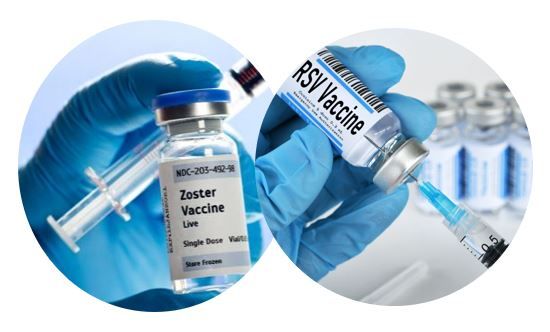- Clinical Technology
- Adult Immunization
- Hepatology
- Pediatric Immunization
- Screening
- Psychiatry
- Allergy
- Women's Health
- Cardiology
- Pediatrics
- Dermatology
- Endocrinology
- Pain Management
- Gastroenterology
- Infectious Disease
- Obesity Medicine
- Rheumatology
- Nephrology
- Neurology
- Pulmonology
Co-administration of Arexvy and Shingrix Yields Positive Topline Phase 3 Data, GSK Reports
Immune responses for both vaccines were noninferior when given at the same visit compared with separate administration among adults aged 50 years and older.
Co-administration of the GSK vaccine Arexvy against respiratory syncytial virus (RSV) and the company's shingles vaccine Shingrix resulted in immunogenicity profiles comparable to administration of the shots individually, according to a GSK announcement.1

Topline data from a phase 3 trial (n = 530) evaluating the immunogenicity, reactogenicity, and safety of the 2 vaccines administered to adults aged 50 years and older at the same clinic visit showed the combination elicited a noninferior immune response compared with separate administration during different visits. The group that received the vaccines sequentially was administered the zoster vaccine first and returned for the first does of Arexvy 31 days later. The adverse events recorded were “comparable” for the co-administration and separate administration groups in severity and duration, GSK reported; they included pain at the injection site, fatigue, and myalgia.1
The findings will be used to support regulatory submissions to the FDA, the European Medicines Agency, and other regulators for approval of the coadministration, according to GSK.1 The results were presented at the European Geriatric Medicine Society conference, September 18-20, in Valencia, Spain, although the company did not provide specific data in its announcement.
The CDC estimate that only 22% of US adults are current with recommended vaccinations, leaving many at risk for vaccine-preventable illness, including the more vulnerable older age groups and those with underlying health conditions.2 “With our co-administration studies, GSK is using its science and technology to help remove barriers to adult immunization, by potentially reducing the number of visits to the healthcare offices and pharmacies and ultimately help to get ahead of RSV and shingles,” Led Friedland, GSK vice president of scientific affairs and public health, said in the news release.1
Arexvy was initially approved in May 2023 as the first-ever vaccine for prevention of lower respiratory tract disease (LRTD) caused by RSV in adults aged 60 years and older. The following June the FDA approved an expanded label, extending the eligible age for the vaccine to adults aged 50 to 59 years. Shortly after that, however, the CDC’s Advisory Committee for Immunization Practices (ACIP) narrowed its recommendations for the adult RSV vaccine, raising the recommended starting age for a single lifetime shot from 60 to 75 years. Among adults between 60 and 74 years of age, the ACIP recommended the vaccine only for those who are at high risk for severe disease.
Shingrix, meanwhile, was approved by the FDA in 2017 for the prevention of herpes zoster in adults aged 50 years and older. The vaccine was recently shown to be 80% effective against shingles in older adults up to 11 years post-vaccination.
